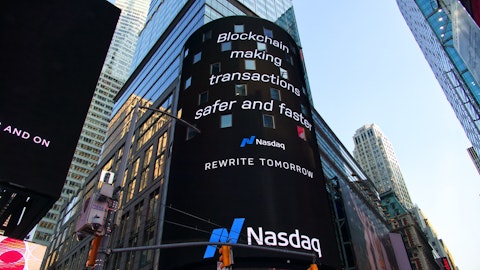As I mentioned in my remarks, most of it is being driven by smaller investors, family offices groups that are seeing the deep discounts that are being offered in the market and are not needing debt financing. That all being said, I do think that sophisticated private equity investors understand the difference between premier workplace and a typical office asset. And I do think for the right asset at the right price, there will be institutional interest in those kinds of assets.
Douglas Linde: Yeah, Jamie, this is Doug. What my sort of add-on would be the capital that’s currently aggressively thinking about office, is thinking about trading, right? They’re looking at, there’s an opportunity for us to get in and then get out at a much higher basis and these are trading sardines, not eating sardines. We are in the eating sardine’s business in general in our portfolio. So we’re looking at these things on a long-term basis, finding a capital partner that is, today, saying, okay, now I want to jump in and I want to invest money for a duration of 10 or 15 or 20 or infinite years. Is certainly more problematic in terms of just desirability because of the nervousness associated with the overall fundamental.
However, there are some, right? And Owen and James Magaldi went to the various parts of the globe this summer and had constructive conversations. We are having constructive conversations with other capital from other parts of the world that are coming into the United States, it’s a slow, slow process. And I can’t tell you that there’s a transaction that will get consummated with BXP with one of those capital partners in the next couple of months. But there are opportunities. And as Owen said earlier in his original comments, we are talking to some JV partners about putting capital into some of our assets right now that would, I think, be the kind of capital that we would look at as long-term quality institutional capital that is not looking to trade for a profit.
And so that is what we’re focusing our time and attention on.
Operator: And I show our next question, comes from the line of Richard Anderson from Wedbush Securities. Please go ahead.
Richard Anderson: Yeah, so thanks using Jamie’s logic, maybe I could sneak in three questions since I’m last.
Douglas Linde: Four if you want.
Richard Anderson: So, Owen, getting back to being prepared to take advantage of the marketplace, it sounds like mostly individual assets you’re focused on. But could there be smaller portfolios or dare I say, companies, either private or public. Or is that just, does that just get too complicated? And I wonder if you could share some sort of dollar value of the pipeline of opportunities that you’re looking at today?
Owen Thomas: Yeah. I’m not going to rule anything out, but I do think the reason that BXP has 94% of its portfolio in premier workplaces as the portfolio has been curated one asset at a time, either through acquisition, development also through our disposition activity. So, I think single asset activity is more likely. And I think it’s difficult to put a dollar value on what we’re looking at. I mean, we are — our job is to be in dialogue with owners of assets that we’re interested in, and the lenders to assets that we’re interested in and these dialogues are fluid. And I think it’s really hard to put a number on.
Operator: Thank you. I show no further questions in the queue. At this time, I would like to turn the call back to Owen Thomas, Chairman and CEO, for closing remarks.
Owen Thomas: Thank you. We have no more formal remarks. I want to thank everybody for their time, attention and interest in BXP.
Operator: Thank you. This concludes today’s conference call. Thank you for attending. You may all disconnect.
Follow Bxp Inc. (NYSE:BXP)
Follow Bxp Inc. (NYSE:BXP)
Receive real-time insider trading and news alerts




